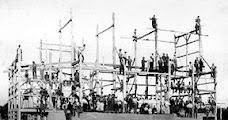Wednesday May 21, 2014  The most important thing I know about teams is that there are no fixed rules, and too many variables involved (especially context, team goals and membership) to rely on a set of simple laws. All we can do is to predict higher team success on a statistical basis if some conditions are in place... The most important thing I know about teams is that there are no fixed rules, and too many variables involved (especially context, team goals and membership) to rely on a set of simple laws. All we can do is to predict higher team success on a statistical basis if some conditions are in place...
So most people learn about those conditions and, in general, about how to develop teamwork from either personal experiences or from some good readings on the subject. There's nothing wrong with that. But what if some of those ideas were no longer true? After all, the infamous "forming, storming, norming, performing" model of team development" dates back to the 1960s...So what's new in the, say, last 50 years of study and research on how to develop teamwork? Again, most of the literature is unanimous on the difficulty of creating a silver bullet or holy grail for teams, focusing instead on conditions that make or break developing teamwork. What are those conditions? Are they the same from 50 years ago or have they changed? Here I want to challenge my readers and invite them to take this 15-question test. It is a great way to get current on the latest research findings on high-performing teams...Just answer all the questions - either True or False - before checking the answers. And don't worry if you miss a few! Are the following Statements True or False? - The ideal number of people in a team is 12
- The presence of an expert in a team increases its effectiveness
- The Team kick-off meeting loses its value if it is repeated in mid-stream
- Teams negotiation of deliverables/resources with stakeholders diverts team energy
- If team members are familiar with each other and have worked together, it is not necessary to define team's working agreements
- In successful teams' conversations there are 2.9 positive comments for each negative comments
- High-performing teams have less conflicts than low-performing ones
- For a team to succeed clear roles and responsibility are more important than an emotional connection among team members
- It's good for an efficient and effective team to have "silent ones" or members that decide not to share their opinions
- If the team has effective formal meetings, then frequent interpersonal communications among team members is not required to reach excellence
- Empathetic decision making in teams is counterproductive if the decision has a strong rational component
- High performing team members have more answers than questions
- Agreeableness is a valuable trait for team members during decision making
- High performing teams focus on team's internal resources and information rather than reaching out of the regular team membership
- The timing of team coaching interventions is different for high performing teams versus lower performing teams
So what are your answers? How many are true, how many are false? Click here for the correct answers to these questions based on the latest research development on teamwork skills.  
| ![]()
![]()

